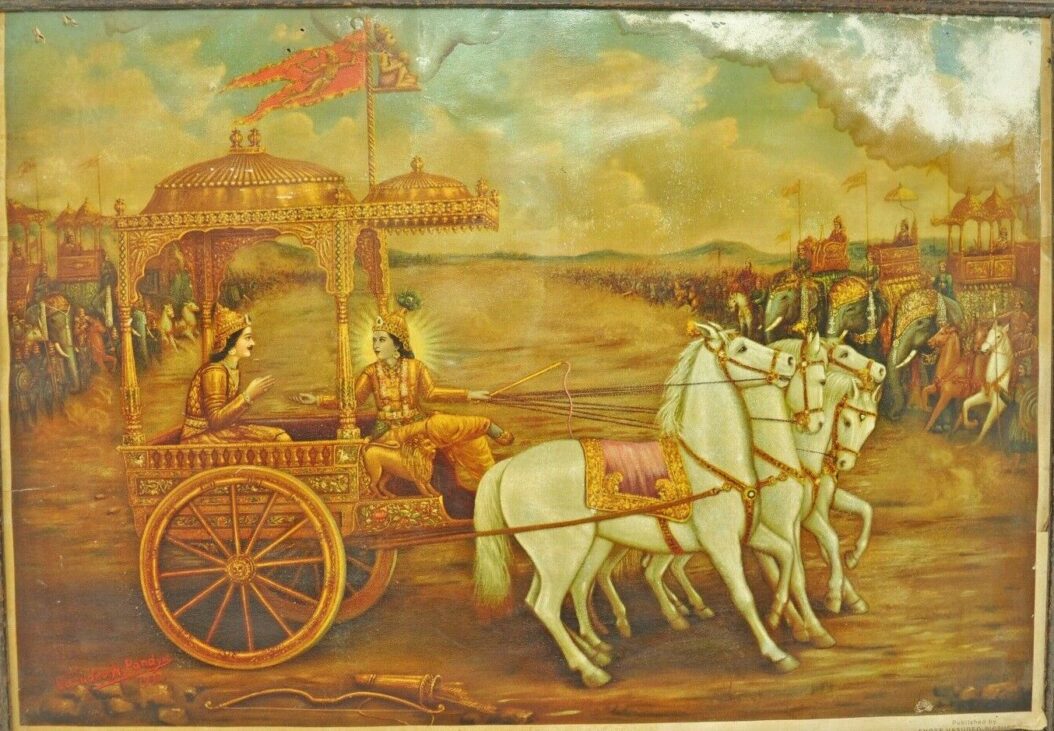
A sacred Indian myth on guidance, the inner battle and how to put skill in action.
Bhagavad Gita – meaning the Song of God is an epic scripture of 700 verses written in Sanskrit. Considered a spiritual masterpiece transcending all Indian philosophical doctrines and convictions, it dates back at least 300 years before Christ. Set up on the battlefield, it is composed of dialogues between Prince Arjuna and his charioteer, Krishna on the eve of war between two huge armies – Pandava brothers and their cousins who have cheated the Pandavas of their rightful kingdom. Prince Arjuna, in a state of conflicting morals and emotional despair is unwilling to pursue this battle against his kins. His charioteer Krishna, reasons why the battle is Arjuna’s ethical obligation :
Wisdom of the decision lies in the discernment of the eternal from the transient.
The Krishna–Arjuna dialogue is an allegory to the inner battle of the human being confronted with the vicissitudes and ordeals of life. Arjuna’s reluctance to go to war elicits moral dilemmas about rights and duties, defense and renunciation, action and inaction. Casebeer features this dialogue in his notable paper on Bhagavad Gita :
It is a timeless dialogue carried on between the hidden core of every striving soul and the apparent self – the body and the ego. Gita, thus would not renounce the physical body, but would regard it as a vehicle for the manifestation of the Eternal.
Gita teaches that there are two selves within a human being – an apparent self, identified with the ego and the deeper supreme real self – Brahman present beneath the sheath of the ordinary self. The apparent self is mutable and ephemeral whereas the supreme self reflects the presence of a particle of God in the human being. Owing to its celestial nature, it is timeless and immortal. Humankind’s tragedy is his unawareness of the supreme being that dwells in him. This oblivious state transforms into uprising inner conflicts wherein one has to negotiate a self-appeasing resolution.

In the backdrop of war, the dialogue questions who we are, our rights and duties, and the higher purpose of life. Krishna marks the necessity of action :
He who acts and does his job in a good way will not be confronted with negative consequences in this world or the next… If the person performs his duties well without expecting anything in return, and leaves the outcome with God, he will not be affected by the consequences. Just like the water lily which does not get wet in the water…
In ancient Indian wisdom, the “charioteer” is consciousness, “horses” are tamed desires, “wheels” are time, “chariot” is the body, and “rider” is the self. The real battle is to dominate the “self” in both action and in thoughts. The thoughts are continuous and are like a storm; they are incessantly renewed. They are powerful. To dominate thoughts is harder than dominating the wind.
Thus self-mastery, as experimented in the practice of yoga, is progressively developed by attention to the thoughts, actions and decisions of everyday life, no matter how big or small. Action which is founded on spiritual knowledge reflects the guidance of deeper consciousness, and steers the soul to its maturity and salvation.
To attain mental balance – steadiness of mind – both attention and action are essential. Spiritual pursuits can be accomplished by action (karma yoga), knowledge (jnana yoga), and devotion (bhakti yoga). They essentially converge and lead one to the virtuous path of becoming human. One must bring steadiness of mind into action :
Yoga is skill in action.
Thus the wisdom of yoga philosophy and its application to practical life has been preserved and practiced ever since the sacred book of Bhagavad Gita. It resumes the spiritual essence of yoga :
Karma yoga
Your work is your responsibility,
not its result.
Never let the fruits of your actions
be your motive.
Nor give in to inaction.
Set firmly in yourself, do your work,
not attached to anything.
Remain evenminded in success,
and in failure.
Evenmindedness is true yoga.
Duygu Bruce







